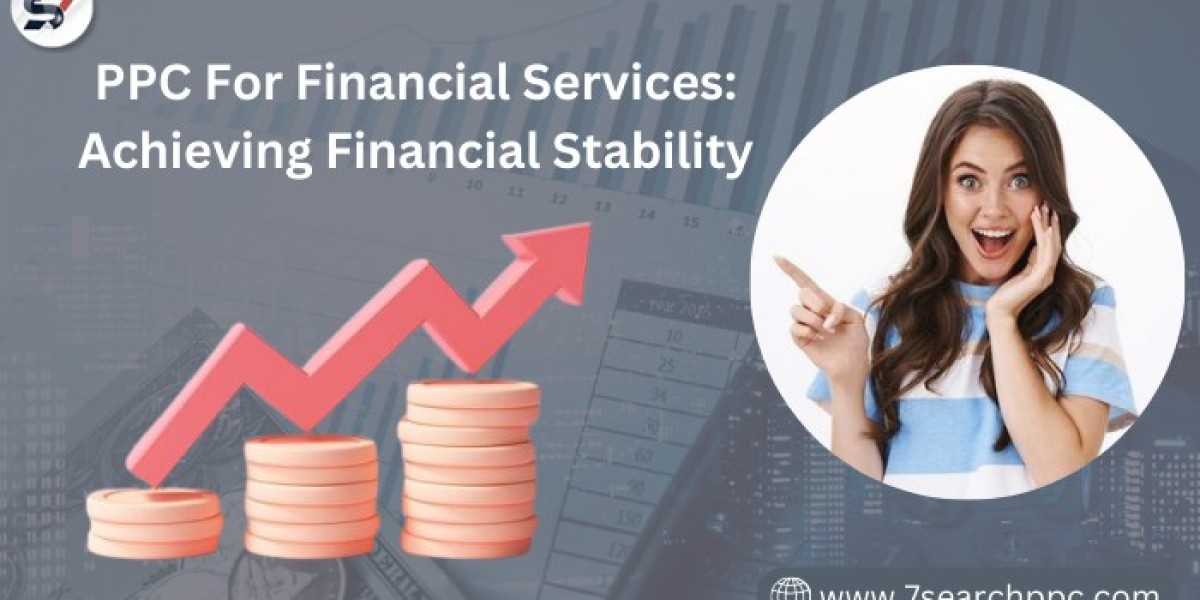Pay-per-click (PPC) advertising has become an essential tool for businesses across industries, and the financial services sector is no exception. In this comprehensive guide, we will delve into the world of PPC for financial services. Whether you are a bank, insurance company, investment firm, or any other financial service provider, understanding how to effectively leverage PPC can help you reach your target audience, generate quality leads, and drive conversions. From keyword research and ad copywriting to landing page optimization and campaign tracking, this guide will equip you with the knowledge and strategies needed to navigate the intricacies of PPC advertising in the financial services industry. Let's dive in and explore the key components, best practices, and challenges of implementing a successful PPC campaign for financial services.

1. Introduction to PPC for Financial Services
What is PPC Advertising?
PPC, or Pay-Per-Click, advertising is a digital marketing strategy where advertisers pay a fee each time their ads are clicked. You can use it to purchase website visitors instead of depending only on natural search traffic. In a PPC campaign, advertisers bid on keywords relevant to their target audience, and when users search for those keywords, their ads are displayed.
Why PPC is Important for Financial Services
In the competitive world of financial services, PPC advertising plays a crucial role. It allows financial institutions to reach their target audience at the exact moment they are searching for relevant services. With PPC, financial services can increase brand visibility, generate leads, and drive website traffic. It's a cost-effective way to compete with larger firms and gain a competitive edge.
Benefits of Implementing PPC in Financial Services
Implementing a PPC campaign in the financial services industry offers several benefits. It provides instant visibility in search engine results, ensuring that your brand is at the top when potential customers are looking for financial solutions. PPC also allows for precise targeting, reaching specific demographics and geographic locations. Additionally, it offers measurable results, allowing you to track the effectiveness of your campaigns and optimize accordingly.
2. Understanding the Key Components of a Successful PPC Campaign
Setting Clear Goals and Objectives
Before diving into a PPC campaign, it's essential to define your goals and objectives. Whether it's increasing leads, boosting conversions, or driving website traffic, having clear goals will guide your entire campaign strategy.
Defining Target Audience and Demographics
Understanding your target audience and their demographics is crucial for a successful PPC campaign. This information helps you create tailored ads and target specific groups who are more likely to convert. Consider factors like age, location, income, and interests when defining your target audience.
Budgeting and Cost Considerations
Budgeting is an essential aspect of a PPC campaign. Determine how much you're willing to spend on advertising and set a daily or monthly budget accordingly. It's crucial to monitor costs and adjust your bids regularly to ensure you're getting a good return on investment.
3. Keyword Research and Selection for Financial Services
Conducting Thorough Keyword Research
A great PPC campaign starts with keyword research. Identify keywords that are relevant to your financial services and are likely to be searched by your target audience. Use keyword research tools to discover popular search terms and long-tail keywords that can help you reach a more targeted audience.
Utilizing Long-Tail Keywords for Better Targeting
Long-tail keywords are longer, more specific keyword phrases that target niche audiences. In the financial services industry, using long-tail keywords allows you to attract users who are looking for specific solutions or services. These keywords tend to have less competition and can generate higher conversion rates.
4. Crafting Compelling Ad Copy for Financial Services
Writing Effective Headlines and Ad Text
When it comes to PPC ads, catchy and compelling headlines are essential. Grab the attention of your audience with a concise and impactful headline that highlights the value of your financial services. Additionally, write engaging ad text that clearly communicates your unique selling points.
Incorporating Unique Selling Propositions
Differentiate your financial services from competitors by highlighting your unique selling propositions (USPs). Whether it's lower interest rates, personalized assistance, or a wide range of investment options, emphasize what sets you apart from the crowd. Make sure your USPs are prominent in your ad copy.
5. Optimizing Landing Pages for Maximum Conversion
Designing Landing Pages with Clear Call-to-Actions
When it comes to PPC campaigns for financial services, one of the most critical aspects of optimizing landing pages is to design them with clear call-to-actions (CTAs). Your landing page should have a clear purpose and guide visitors towards taking the desired action, such as filling out a form, subscribing to a newsletter, or requesting a consultation. Make sure your CTAs are prominently displayed, and easy to locate, and use compelling language that encourages visitors to take action.
Mobile Optimization for Financial Services Landing Pages
It's imperative to make sure your landing pages are mobile-friendly in the mobile-first world of today. Many potential customers will access your landing pages through smartphones or tablets, so making sure they have a seamless mobile experience is essential. Optimize your landing pages for mobile by using responsive design, ensuring fast loading times, and simplifying forms and navigation. By catering to the mobile audience, you can capture more leads and enhance the overall effectiveness of your PPC campaigns.
6. Tracking and Analyzing PPC Campaign Performance
Setting Up Conversion Tracking and Goals
To effectively track and analyze the performance of your PPC campaigns, it's essential to set up conversion tracking and goals. Conversion tracking allows you to measure the actions taken by visitors who clicked on your ads, such as form submissions, purchases, or phone calls. By defining clear goals and tracking conversions, you can evaluate the success of your campaigns and make data-driven decisions to optimize your advertising efforts.
Analyzing Key Performance Metrics for PPC Campaigns
Analyzing key performance metrics is crucial to understanding the effectiveness of your PPC campaigns. Click-through rate (CTR), conversion rate, cost per conversion, and return on ad spend (ROAS) are important metrics to track. These metrics provide valuable insights into campaign performance, allowing you to identify areas for improvement and allocate your budget effectively. Regularly analyzing these metrics will help you optimize your campaigns and achieve better results.
7. Best Practices and Strategies for PPC in the Financial Services Industry
Adhering to Compliance and Regulatory Guidelines
In the financial services industry, compliance and regulatory guidelines play a crucial role. When running PPC campaigns, it's essential to ensure that your ads and landing pages comply with these guidelines. Familiarize yourself with the specific rules and regulations that govern your industry and make sure your ads are transparent, accurate, and compliant. Failure to adhere to compliance guidelines can result in penalties, reputation damage, and even legal repercussions.
Leveraging Remarketing and Retargeting for Financial Services
Remarketing and retargeting are powerful strategies for engaging with potential customers who have previously interacted with your brand. By placing a tracking pixel on your website, you can target these individuals with tailored ads when they browse other websites or platforms. Remarketing allows you to stay top-of-mind and re-engage with potential customers who have shown interest in your financial services. It's an effective way to increase conversions and drive higher engagement rates.
8. Challenges and Pitfalls to Avoid in Financial Services PPC Campaigns
Overcoming Ad Fatigue and Banner Blindness
In the competitive world of financial services PPC advertising, ad fatigue, and banner blindness are common challenges. Ad fatigue occurs when your target audience becomes tired of seeing the same ad repeatedly, leading to reduced engagement and conversion rates. Banner blindness refers to the phenomenon where users unconsciously ignore banner ads due to their overexposure. To overcome these challenges, regularly refresh your ad creatives, test different ad formats, and experiment with ad placements to maintain audience interest and avoid monotony.
Avoiding Irrelevant Keywords and Targeting
Using irrelevant keywords and targeting can waste your budget and yield poor results in financial services PPC campaigns. It's crucial to conduct thorough keyword research and ensure that the keywords you choose align with the intent and interests of your target audience. Refine your targeting by considering factors such as demographics, interests, and behavior to reach the right people with your ads. By avoiding irrelevant keywords and targeting, you can increase the relevance and effectiveness of your campaigns.
Managing Budgets and Bidding Strategies for Financial Services
Effective budget management and bidding strategies are essential for financial services PPC campaigns. Set realistic budgets that align with your business goals and allocate your budget strategically across different campaigns and ad groups. Monitor your spending and regularly optimize your bidding strategies to maximize the return on investment. Experiment with bidding options such as manual bidding, automated bidding, or bid modifiers to find the approach that works best for your financial services PPC campaigns.
In conclusion, implementing a well-executed PPC campaign is essential for financial services to stay competitive in the digital landscape. By adhering to the best practices outlined in this comprehensive guide, you can effectively target your audience, increase brand visibility, and drive valuable conversions. Remember to continually monitor and optimize your campaigns, staying up to date with industry trends and regulations. With the right approach, PPC advertising can be a powerful tool to help your financial services business thrive in the digital age.








